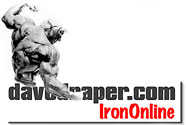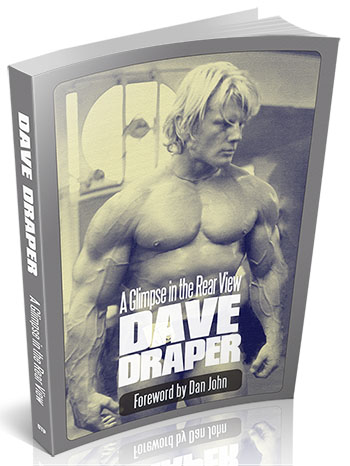Training Past 40

Dave Draper's Iron in My Hands
Download the full Draper here newsletter
in printable, live-link, pdf format, here.
If you've been training since your teens or 20s and you're now over 40, you know, of course, that you're hooked. You can't let go. But then conventional wisdom slaps you in the face and tells you you're in for a change in your training and expectations.
When I was well into my 40s, I discovered that the most intimidating enemy in the process of advancing years is conventional wisdom itself. Constantly we are told that we must hold back, that training, regardless of age, stresses our muscles, which leaves slight tears, which in turn leaves scars, eventually resulting in injuries, and that the older we get and the longer we train, the more injuries accumulate. Thus, caution must be the order of our days as we pass 40.
Decreasing muscle response and increasing skin elasticity also take their toll, we are told, so look for other benefits. Don't expect to make gains. Give it up. Settle for maintenance.
For a few years into my 40s, I submitted to that conventional wisdom. I held back, feeling the accumulated injuries of more than 30 years of training, especially in my shoulders, elbows and lower back. Those pains were real, and their persistence convinced me I could no longer train as fast as I had in my youth, that I required longer recovery periods, that my durability was not what it had been and that where I used to go for that last rep, I should hold back or possibly suffer another injury that might halt my training for good.
I persuaded myself I should simply be glad to be alive and that, along with cumulative injuries, age also brings compensatory gains in wisdom. I was expected to put that wisdom to use by accepting age gracefully.
Now I see that just as the mere awareness of age can affect our ego and attitude, so can a more confident and determined attitude awaken us to the fact that the other side of 40 holds a valid promise for improving both strength and physique.
The hint of this was always with me, even in my more timid years. There wasn't much difference in my training in my 40s versus when I was in my 20s. In fact, I still did some of the same things through my mid 60s and did them with as much vigor and enjoyment as I did then; in fact, with more enjoyment than I had then. No longer did I have the apprehension when approaching my workouts that was there when I was younger.
I also noticed I was reluctant to hold back, that I love to push to the limit. That's when I was the happiest, and age did not quell those feelings.
Bodybuilding's new-found popularity fed this feeling. It's no longer the subculture it was in my early years. It's now embraced by the public, and seeing it around me fueled my enthusiasm all the more through those middle-age years.
Gradually, I stepped out of the maintenance plan of my early 40s and looked toward greater training intensity through my 50s, reincorporating that same locomotion and thrust in the movements that I always had and always loved.
There was one difference, though, and it's one that can come only with maturity. I found myself wanting to practice wisdom and not be foolish. I saw myself progressing heavier in the weights, but instead of gulping it all at once, I was sipping it gradually, savoring it and enjoying it more, taking my time to get up there, stretching out the goals.
Never have I competed with others in my workouts; never did I try to keep up with others in the gym, and that's even more important in the middle and later years. I have always been in competition only with myself and I encourage that in you.
At this stage of life, you don't need as much work because you know how to train better. In fact, if you're anything like me, you may have overtrained all your life; now, by holding back somewhat and having another kind of patience, it is possible you can step forward and make significant gains. However, once you're accustomed to overtraining, it's difficult to relax or cut back, regardless of your age.
Once I reduced my workouts from six days a week to three on, one off, I encountered fewer painful days, and then my strength went up. But the biggest problem was adapting to it, breaking the old habit, even though that lesser plan is, I'm now convinced, a better way to train. That's why stepping out of an overtraining schedule, persuaded by age, allowed me to proceed to another plateau, and this may work for you too.
Mentally, I also found that my focus was on the finer mechanisms of the body rather than on simply a brutish workout and ego gratification. I began to use more full-range movements and quality training with a good flow. Certainly I did more warming up than in the earlier years, especially for the lower back, hamstrings and shoulders.
Essentially, you want to put everything in your favor as age advances: keeping workouts slower and more concentrated, making sure to harness that energy in your movements, paying attention to reps, thinking about your lower back and knees, and trying to go slowly but consistently heavier.
While a certain training approach worked for me when I was young, I faced the question of what would work best for me at later ages. What could I do to not merely maintain, but to actually improve?
There may be a plateau from ages 40 to 45 and another from 45 to 50, but with each one, you can strive to go a little above the one that proceeded it. Maybe there will be another one somewhat above 50 when you will have to relinquish a little more. By then you will have gained more wisdom and will have found new ways to compensate.
A maturity process will have taken place that can allow you to put egoistic concerns on the back burner and proceed with realistic objectives in other facets of life that make "not letting go" an even stronger impulse.
The most profound discovery I made after passing 40 is that life is more and more a learning experience. In youth, education seems to be the lowest of priorities, for there are appetites to be explored and egos to be nurtured. Beyond 40, however, a maturity normally occurs in which your appetites change.
That is a result of time, and we are struck with the realization that there is so much more to life that can provide gratification than we can possibly assimilate. Suddenly our simple hungers seem insignificant.
That is when the journey beyond 40 becomes a reward. It's a reawakening to what more there is to life. It's an awareness that you are just starting; actually, that you are always just starting.
This is all obvious, but it seems that little of it sinks into a young mind. A "youthful mind," on the other hand, absorbs more of it.
Perhaps that's the greatest irony of aging: You don't acquire a youthful, hungry mind until you have been liberated from being young.
dd
*****
Take a trip over to our
Musclebuilding Q&A Blog
... where Dave allows us a peek into his email outbox.
Did you sign up for Dave's expanded email yet?
It's free, motivating and priceless!
We'll also send you a link to Dave's free
Body Revival Tips and Hints e-report with your confirmation notice.

